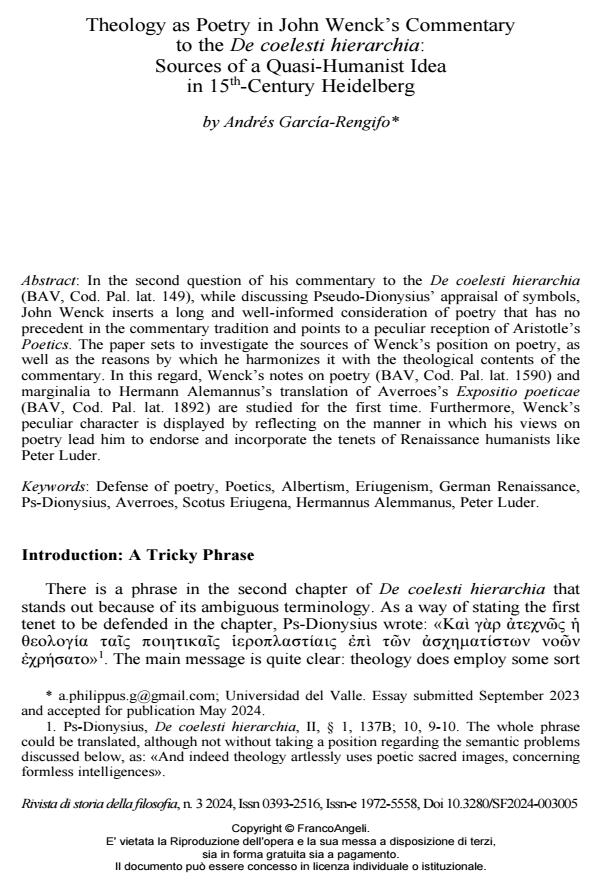Theology as Poetry in John Wenck’s Commentary to the De coelesti hierarchia: Sources of a Quasi-Humanist Idea in 15th-Century Heidelberg
Titolo Rivista RIVISTA DI STORIA DELLA FILOSOFIA
Autori/Curatori Andrés García-Rengifo
Anno di pubblicazione 2024 Fascicolo 2024/3
Lingua Inglese Numero pagine 29 P. 582-610 Dimensione file 353 KB
DOI 10.3280/SF2024-003005
Il DOI è il codice a barre della proprietà intellettuale: per saperne di più
clicca qui
Qui sotto puoi vedere in anteprima la prima pagina di questo articolo.
Se questo articolo ti interessa, lo puoi acquistare (e scaricare in formato pdf) seguendo le facili indicazioni per acquistare il download credit. Acquista Download Credits per scaricare questo Articolo in formato PDF

FrancoAngeli è membro della Publishers International Linking Association, Inc (PILA), associazione indipendente e non profit per facilitare (attraverso i servizi tecnologici implementati da CrossRef.org) l’accesso degli studiosi ai contenuti digitali nelle pubblicazioni professionali e scientifiche.
In the second question of his commentary to the De coelesti hierarchia (BAV, Cod. Pal. lat. 149), while discussing Pseudo-Dionysius’ appraisal of symbols, John Wenck inserts a long and well-informed consideration of poetry that has no precedent in the commentary tradition and points to a peculiar reception of Aristotle’s Poetics. The paper sets to investigate the sources of Wenck’s position on poetry, as well as the reasons by which he harmonizes it with the theological contents of the commentary. In this regard, Wenck’s notes on poetry (BAV, Cod. Pal. lat. 1590) and marginalia to Hermann Alemannus’s translation of Averroes’s Expositio poeticae (BAV, Cod. Pal. lat. 1892) are studied for the first time. Furthermore, Wenck’s peculiar character is displayed by reflecting on the manner in which his views on poetry lead him to endorse and incorporate the tenets of Renaissance humanists like Peter Luder.
Parole chiave:Defense of poetry, Poetics, Albertism, Eriugenism, German Renaissance, Ps-Dionysius, Averroes, Scotus Eriugena, Hermannus Alemmanus, Peter Luder.
Andrés García-Rengifo, Theology as Poetry in John Wenck’s Commentary to the De coelesti hierarchia: Sources of a Quasi-Humanist Idea in 15th-Century Heidelberg in "RIVISTA DI STORIA DELLA FILOSOFIA" 3/2024, pp 582-610, DOI: 10.3280/SF2024-003005